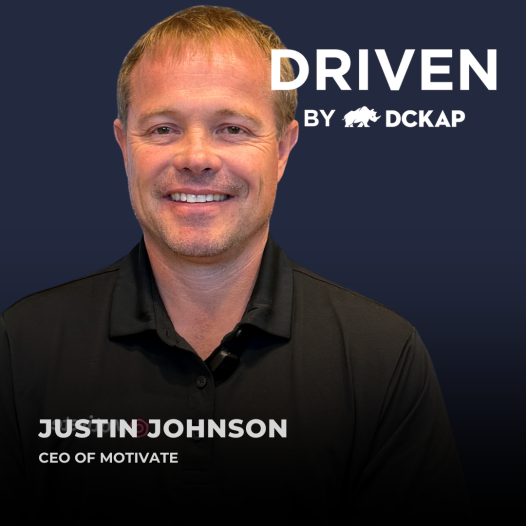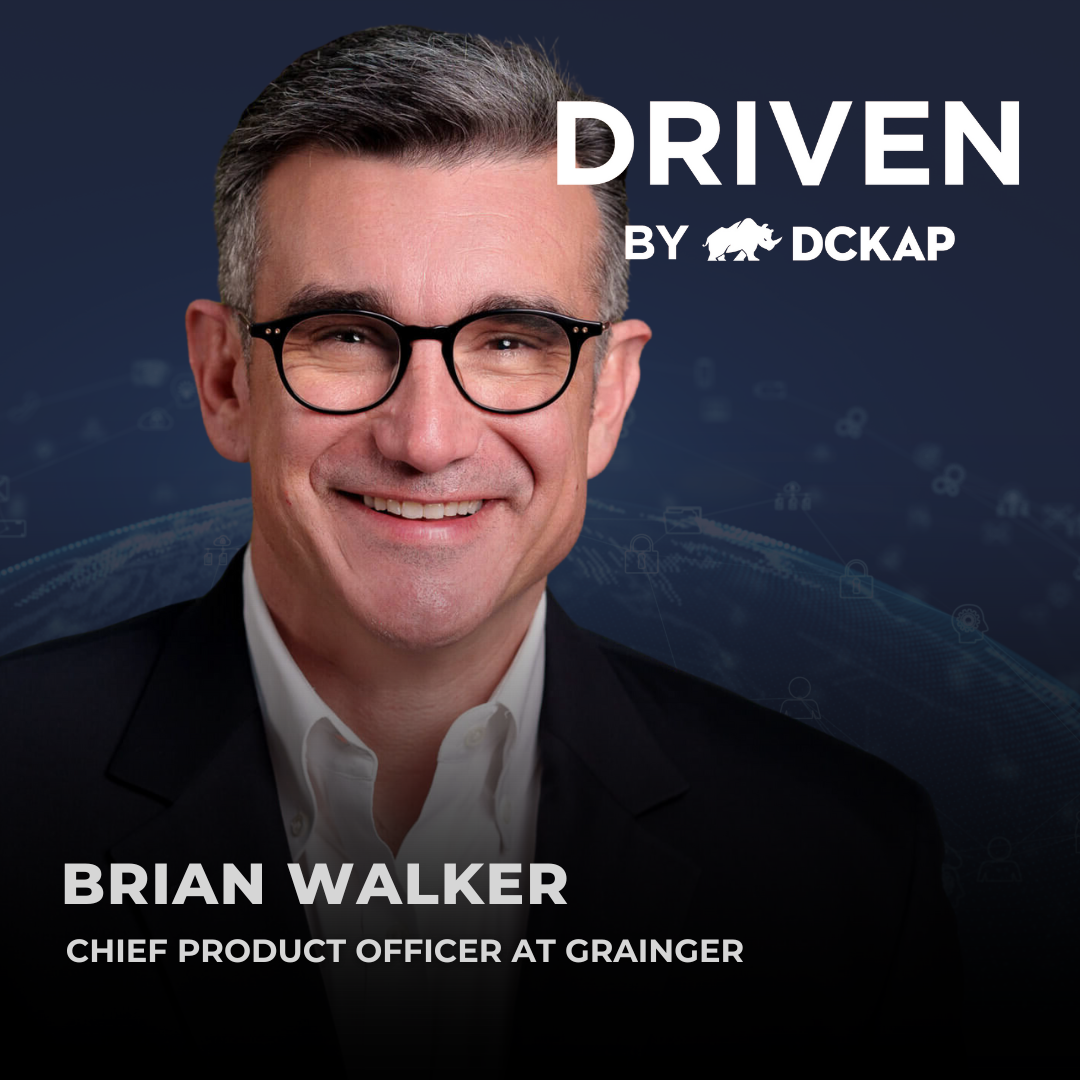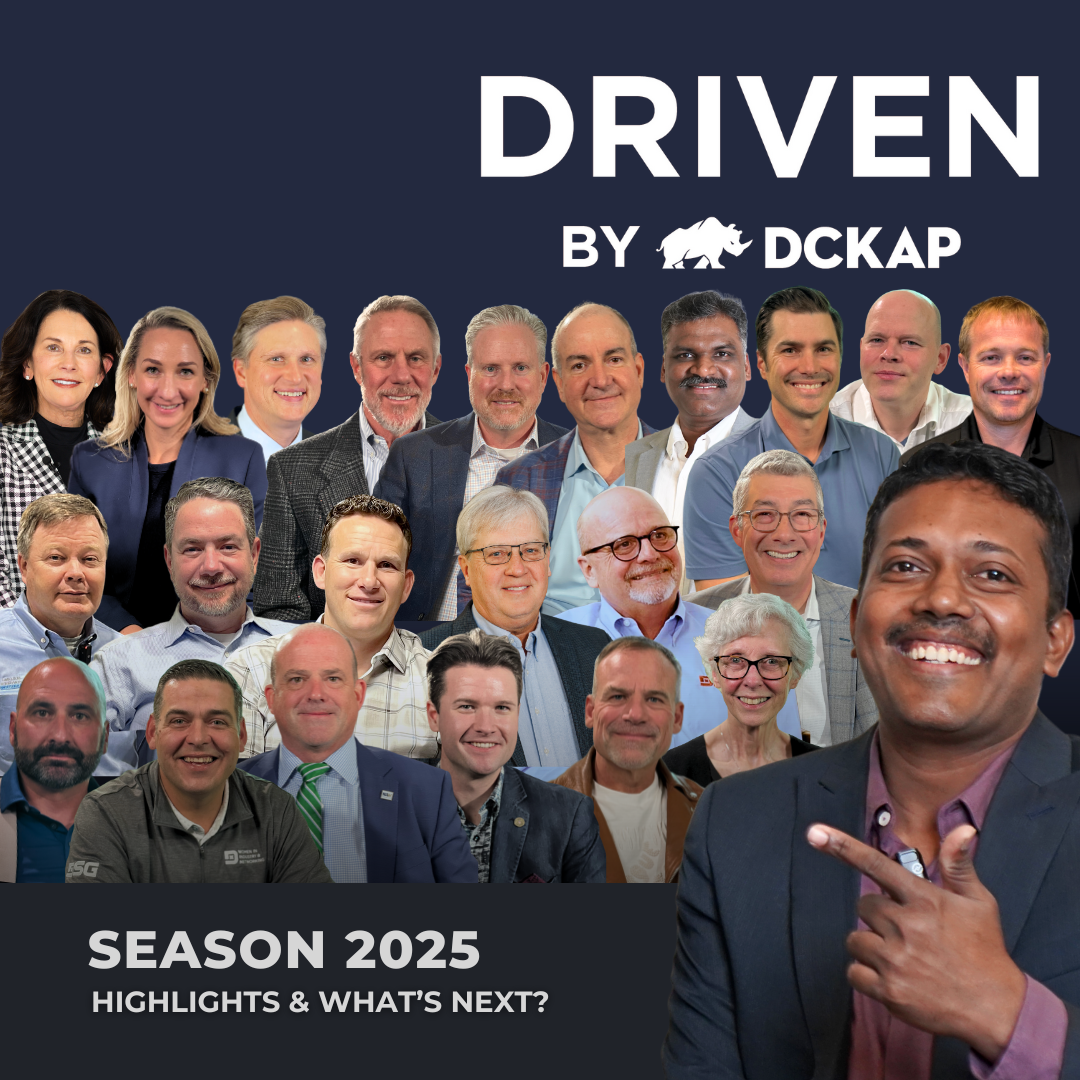Watch to understand more about AI-assisted orders, multi-channel ordering via text, e-commerce drag-and-drop technology that actually works for distributors, sales intelligence that predicts customer needs before they call, why traditional e-commerce fails for B2B distributors, and more.
Justin brings 25 years of distribution technology experience and shares insights from building his fourth company. Learn why AI isn’t just a competitive advantage anymore—it’s a necessity for wholesale distributors, plumbing suppliers, electrical distributors, HVAC companies, and building material suppliers.
OR LISTEN ON:
Karthik Chidambaram: Hello everyone. Welcome to a brand new episode of the
Driven by DCKAP podcast. Today we are joined by a very special guest. Justin
Johnson, Chief Executor Officer of Motivate.
Justin, thank you so much for joining me today, and great to have you on our
show.
Justin Johnson: Awesome. Appreciate it. I'm a big fan of your pod, so thank
you for having me.
Karthik Chidambaram: Justin, this means a lot to me, so thank you.
So Justin, for the audience who are not very familiar with Motivate, can you
tell us, what does Motivate do?
Justin Johnson: Motivate is a sales order and quote automation product. So
we free up time from the inside salespeople, processing orders and quotes,
and then we introduce sales insights. So we fill that time with additional
sales guidance from what customer to call and when. And then we also have a
patent pending e-commerce module where a customers can log into a
distributor's website, drag and drop their unstructured files, and buy 20 to
a hundred items within seconds.
Karthik Chidambaram: So let's talk about sales, auto automation. Everyone
likes to automate. Yes. When it comes to automation, how are you exactly
doing that? For instance, the common use case is, okay, now there's a fax
order which comes in and you automate it. Is that the common use case, or
how exactly are you automating?
Justin Johnson: We automate all customer communication, so especially in
quotes and orders, a quote will come in, or a request for an order comes in
via email, so that'll include a handwritten note that somebody took a
picture of an Excel file.
A PDF and we read that unstructured content, which is key because a
traditional and A CSR will go from a file, and if it's 10 items, that takes
quite a bit of time. If it's a hundred or a thousand lines. In a quote
request, they go over to the ERP and they type that in. It takes a ton of
time prone to errors.
So that's the piece that's really freeing up a ton of time from the customer
service rep to be able to spend more time with customers. That's the
automation post.
Karthik Chidambaram: So do you also do voice automation? For instance, let's
say, you know, I wanna make an order. Mm-hmm. I just ask. Okay, Siri, you
know, I need to order this.
So do you guys do that as well? Let's say, can you convert a voice note into
an order?
Justin Johnson: We can voice, text, WhatsApp, email, any way that the
customer's communicating. We have a voice agent where a customer calls a
phone number. It interacts. We can look up the customer account information,
existing order history within the ERP, so intelligently communicate back
about, Hey, you're set to replenish this order next week.
Is that what you're calling about? Yes, it is. Great. Let's execute it. And
then we can do confirmations of that order via text or email.
Karthik Chidambaram: You talked about sales intelligence, is that more of an
analytics tool or what exactly is that?
Justin Johnson: That's exactly what it is. So we look, we understand
existing order history for customers and the patterns, and we start to
cluster customers that are like for like, and say, okay, well these five
customers consistently buy these products.
Why are these two not? Acting the same way, and we start to, you know,
message inside sales CSRs about predictability, about what's happening. So
our goal is to show up before the customer even knows it's a need for them.
That's that. Up, up levels, you know, customer service in a very competitive
market, as you know for distribution, you wanna be the company that has the
best customer service and analytics.
It does that in a lot of ways
Karthik Chidambaram: and commerce automation. You talked about a patent
pending product. You showed me a demo as well. Sure. I thought that was
pretty cool. Ah, thanks. So can you talk to us about it?
Justin Johnson: Yeah. So this was actually one of our customer's ideas.
We're very, very good at the order automation and effectively reading
unstructured content. And quickly matching at a high degree of accuracy with
the catalog. And that's key.
So we met with our friends in the e-commerce space and built an application
where a customer can drag and drop their unstructured files to the website
to buy in seconds. As you, as you know, a lot of people have in invested a
lot of time and money into e-commerce.
And the results have been, you know, fair at best. One in 2% of overall
revenue is going through e-commerce, but these teams have done everything
right. They've implemented some of the best e-commerce platforms out there.
They have custom pricing, you know, availability, all those different
things. But customers are still not buying.
And, and a big part of it that we found out pretty quickly is customers.
Distributors buy off lists. They have purchase orders that are issued to
them by their accounting teams. Right? And so why would somebody go and
retype 20 items into an e-commerce environment to search and then add each
one of those to the cart. They don't buy like we do on Amazon.
So, yeah, we filed multiple patent applications around this to try to create
a competitive mode there, where a customer can drag and drop it in. The
functionality that's really taken off is the text. We call it text to cart.
So you associate a phone number with the e-commerce buying experience.
A customer is in the field doing their work. They're not gonna engage with a
website, at least they prefer not to. They've told us that they want to text
a number with their handwritten order. We send back a confirmation and they
can buy online with just a text.
Karthik Chidambaram: Very interesting. Let's say I'm a sales rep at a
customer location.
Justin Johnson: Sure.
Karthik Chidambaram:And the customer says, Hey, you know, I need this, this,
and that. Write it by hand.
Justin Johnson: That's right. Text it. Yep. And that gets converted to an
order. That's exactly what happens. And we send a confirmation back of the
matching. 'cause as you know, people don't always order with UPCs or you
know, product ads or SKUs.
They have descriptions. Those descriptions can be converted to anything.
Right. Sometimes the color or the size isn't picked. And so we do our
matching on the fly and then people can confirm right there. But yeah, I
mean, our customers at the branch level. At the desk, a customer will walk
in and verbally give an order.
And the CSR, the desk person running the desk will write it down, take a
picture of it and send it through and it's done. So automation is everything
in this world, as you know, because it's about who spends more time. With
the customer, we wanna free up that tactical work so they can spend more
time on the strategic relationships to grow business.
Karthik Chidambaram: And you guys are focused just on the distribution
industry, and you cater to the distribution market or the distributors,
correct?
Justin Johnson: That's correct, yeah. I mean, we do have a couple
manufacturing customers, but distributors are the ones that are calling us
multiple times a day saying, I need help here. I need to free this up.
And a big part of it is employees, as you know. You know, attracting and
retaining good employees is hard, especially right now with this labor
market. And so yeah, owners of these distribution groups are kept up late at
night. Trying to figure out how they're gonna keep up with demand. There's
nothing worse than not responding to a customer that wants to order your
product for days.
Right. So they want to accelerate this and just make sure that customers are
being taken, taken care of. And that's where automation comes in for sure.
And
Karthik Chidambaram: How are you finding customers?
Justin Johnson: We are obviously, you know, showing up at the buying groups.
We are currently here at the Eclipse user group. We were at a P 21
conference, so we like to go where the ERPs that we work with, SAP, some of
the other ones.
Fortunately, we have a lot of customers calling us. I've been in this
business for about 25 years. This is actually my fourth company, so I know a
lot of people in the space and they trust the products that I build, and
it's like, what's, what's Justin doing now? It's gotta work. So yeah, those
relationships matter a lot, but we don't have to do heavy marketing.
We have a great product and a great brand name, and people are coming to us.
Karthik Chidambaram: Tell us about your other three companies. What got you
into Motivate?
Justin Johnson: So I've always worked in, I started my career and worked
with a company called Big Machines by way of another business that was
acquired by them.
So I understood the inefficiencies of, you know, the order sales operations
within distribution and manufacturing. So I've been here for a while. My
first couple companies were around channel engagement, so how manufacturers
and distributors interact and engage over leads, opportunities, quotes. And
just customers.
'Cause there's a, they're channels obviously, and we really did a great job
with that. And I sold a couple companies to private equity already. AI is a
big thing for me. I started my career as a developer and, you know, the
opportunities that come with AI and the efficiencies can be gained and the
opportunity and distribution is really what led me to it.
So it's been a ton of fun, but I just, I love this market. I love, you know,
the small to mid-size. Distributors some still family owned and independent
and really helping them accelerate their business is just what gets me up in
the morning.
Karthik Chidambaram: And how do you price your products at Motivate? Is it
based on the number of transactions or how does that work?
Justin Johnson: Yeah, we like to to price it based on the size of the
organization and the, the transactions that they have. We don't want to
limit, you know. Smaller companies from taking advantage of great software.
And so it's based on the size of the organization, the number of
transactions they have. So small companies are at a lower rate than the
large companies.
It's effectively the same software. Larger companies get more usage out of
it, more gains. So that's typically, but we're, I intentionally like to do
the small to mid-size companies. I just, it's a great experience for us, you
know, interact with the owners often and you know, the, the family and you
can just see.
That's where friendships start, and you have 'em for years and years.
Karthik Chidambaram: And who's your ideal customer? Is it electrical
distributors? Plumbing distributors? Are you focused on a specific industry?
Justin Johnson: You know, like I said, we're, we came outta the gate with
some plumbing, HVAC, and electrical distributors 'cause the volume is quite
high there. But we haven't chased anything.
We've just sort of let the companies come to us when we've been visible
enough with some of our customers, in our case studies, I mean food
equipment, even food distribution. A couple, a customer that's doing like 20
million lines a month right now in the food space.
So lumber, hardware, industrial, it's across a lot of different markets. So
we, we like to have a diverse client set 'cause we learn more, you know,
the, the sort of, the breadth and depth of all of that instead of just
staying in a specific vertical. But I would definitely say, you know,
building supply, electrical, hvac, plumbing, that's kind of our core, but we
can work with anything.
Karthik Chidambaram: And what's been your big learning running Motivate?
Justin Johnson: I think that the reality is AI. And, you know, we've written
our own LLM models, right? You start with sort of some of the initial open
AI and grok and llama and some of that. But we've, we've been doing this
long enough and worked with for 25 years.
You work with almost every catalog, right? And so you understand what's
here. So we've written our own models. I think that. Experience that I've
seen is that AI is here, it's here to stay, and it's accelerating the
businesses that use it at a level that no one even thought was possible. And
it's just getting started.
So, you know, my recommendation for distributors, whether it's working with
us or someone else, you gotta go there. 'cause it's not a competitive
advantage anymore, it's a necessity. You just have to, so that's what I've
learned.
Karthik Chidambaram: And how do you keep yourself updated with what's
happening in the industry?
You talked about ai. There's a lot of things not just in ai, but also in
business. Sure. And when it comes to ai, how do you apply that to your
business? Right. So how do you keep yourself updated?
Justin Johnson: Yeah. You know. I've always prescribed, 'cause I started as
a developer. Mm-hmm. And then I got into product management and worked for
some very large organizations before I started my own company.
And, you know, listening to the voice of the customer was everything for me.
You know, the late Harvard professor Clayton Christiansen, who coined, you
know, somebody has a job to be done. That's the part to focus on. It's not
the customer's not buying a quarter inch drill, they're buying a quarter
inch hole in the wall.
To hang a picture. So, and I train my team and really coach them constantly
about thinking ab you know, what problem is the customer solving needs to
solve? I don't care what kind of tech it is, it's ai, it's traditional, you
know, machine learning or what it is the customer just needs to solve that
they get, you know, because AI is so interesting and it's the buzzword and
people wanna learn the mechanics of it.
People are a little more interested in the technology now than they had in
the past, but there's gonna be some other technology next year we have to
stay ahead of it. To make sure that we're solving the problem the customer
needs. You know, I've been in the tech space for a long time, so I stay on
top of the blogs.
I have a lot of friends. We've raised this, not this company, but my
previous companies have raised quite a bit of money from some forward
thinking private equity companies, and so I, I stay in touch with that
group. The most important thing is listen to your customers and spend time
with them, and that's where we learn what we need to do.
The technology is just the execution of what they wanna solve.
Karthik Chidambaram: Listen to your customers and spend time with them.
That's a great way to end the conversation. Thank you so much.
Justin Johnson: Appreciate you very much. Thank you. It's awesome.
Sign up to receive email updates
Enter your name and email address below and I'll send you periodic updates about the podcast.




